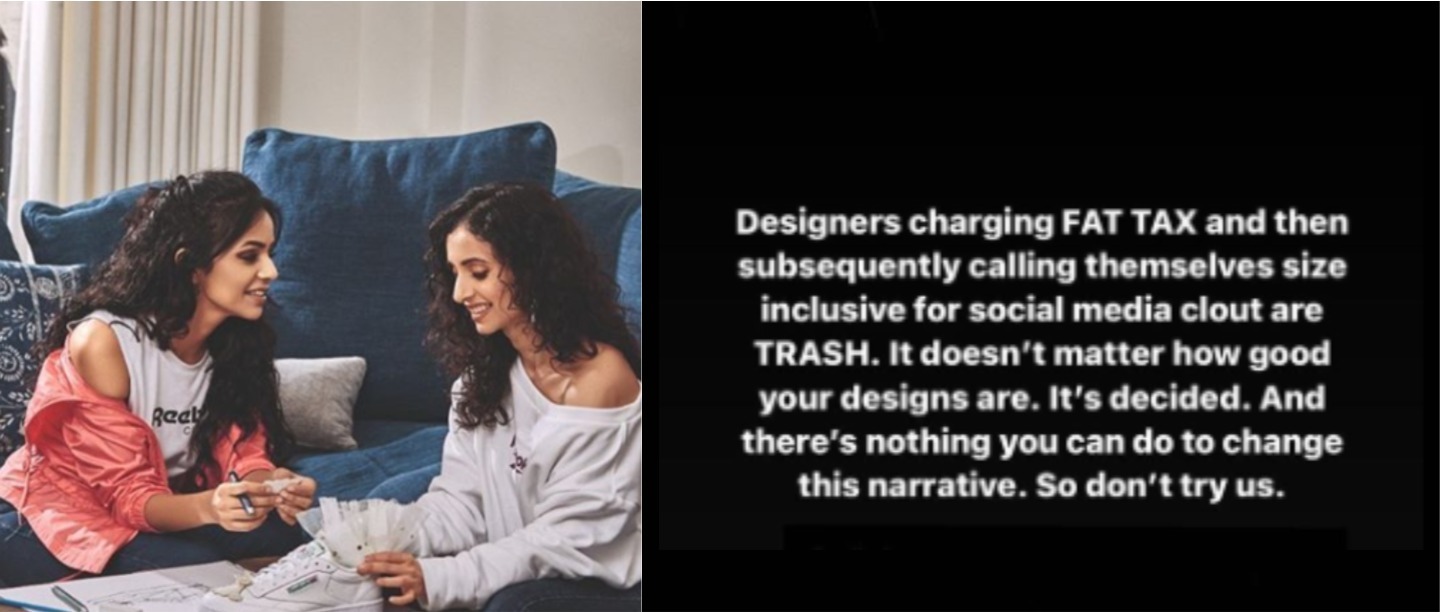
Hello dears, the fatphobia is real. There is no missing out on it. Chances are, that everyone ranging from your distant, self-proclaimed aunt to a stranger on the internet and family closer home may have weighed in on your ‘health’, at some point or the other. But not one to disappoint all of the above, the fashion industry too, has a ‘fat’ problem, a phobia, that is (if it weren’t clear) and even those who like to keep their rose-tinted glasses on cannot deny it.
Here’s the lowdown of recent happenings for anyone who missed it— On Instagram, Aishwarya Subramanyam (@otherwarya) raised a question about brands asking curvy people who opt for bigger sizes to pay extra, a ‘Fat Tax’, if you will. The topic was picked up by Diet Sabya (@dietsabya) and it led to a discussion on the latter’s platform, people weighing in with first-hand testimonies. You can get an in-depth account of it all here.
Designers Gauri & Nainika Acknowledge The ‘Fat Tax’
These real stories aren’t new, not for anyone who has a) had to go through the traumatic experience of being shamed for their body, b) worked in any industry even slightly related to fashion and apparel. From in-store people smirking at customers or giving them the unsolicited “oh, that won’t fit” to designers refusing to dress plus-size people on any front, this is as true as it gets. In the issue raised by Aishwarya Subramanyam and Diet Sabya, it was about designers charging extra from clients who don’t fit into the said small and medium sizes. So forget paying lakhs for couture from your favourite A-list designers, because your body requires that you pay even some more. As the testimonies revealed, customers have often been asked to pay more if they fall in a size that goes beyond their generic size chart, citing embroidery cost, fabric cost and just about any cost for that extra buck. Forget, of course, that major design houses buy their fabric in surplus, get work done in set costs that leave little for craftspeople affiliated with them (a whole other story and an equally important one). So the whole charade of asking customers to pay as per body sizes is downright unethical.
Talking about it is the only way it can be highlighted and resolved. Post all of it, designer duo Gauri & Nainika acknowledged that they too, had charged extra on occasion and it had always been an “uncomfortable” place. Putting an end to these charges based on sizes for once and for all, they further revised their terms and conditions to reflect the change. A condition that should never have existed in the first place, but owning up to discrimination and acknowledging a problem takes courage. We are glad that someone decided to correct things where required. Some names like Raw Mango and Papa Don’t Preach By Shubhika don’t abide by this practice while since the debate, Karan Torani has also pledged to follow a fair process. Here’s Gauri & Nainika’s complete statement.
The Tokenism Needs To Go
This is just the tip of the iceberg. Labels, from designer to retail, highlight themselves as ‘plus-size inclusive’ if they simply go beyond an ‘L’ size. Naturally, they don’t stock up on any sizes that ACTUALLY cater to plus-size folks, faltering at an ‘XL’ and thus, depicting one of the forms of tokenism that is rampant in the industry. Not to forget, of course, the designer runways which have one or two plus-sized models among a sea of thin models. Where is the representation? Not on Instagram for sure, for unrealistic beauty standards dictate that plus-sized models are either not accounted for used to only wash hands off of the entire discussion. It’s not just limited to women either; presenting clothes on a minimum number of plus-sized people is considered a fair deal, a feat to grab some eyeballs, get that pat on the back for doing the bare minimum and then walking away.
One would have imagined that by 2020, we would have learned, but things are clearly far from it. Fashion isn’t just restricted to people who tick these metaphorical boxes for designers (thin, tall, fair-skinned) because at the end of that day, it’s democratic or it’s nothing. Let’s take that tokenistic inclusivity from the runways and replace it with real, individual bodies that are relatable and ensure that it trickles down to stores as well. It’s 2020, for crying out loud. Don’t smirk and tell me what I should pick and should not because it “won’t fit”.
You may also like to read:
For Her 40th Birthday, Kim K Takes A Trip To Tone Deaf Land & Twitter Is Furious
Featured Image: Instagram
Read More From Fashion
Nita Ambani & Shalini Passi Rocked The Quirkiest Bags At An Event & We’re Obsessed!
Vedika Negi